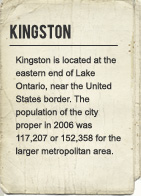Anti-Semitism
All through the 20th century and even into the 21st, Kingston has harboured its share of anti-Semitic attitudes, shaped by prevailing stereotypes, prejudices and practices. Jews were banned from the Cataraqui Golf Club and the Kingston Yacht Club until the mid-1960s. As well, in the early years, there were attempts to keep Jews out of certain areas of town, or of business, and Jews were not admitted as professors at Queen’s. The situation changed after the Second World War, when overt discrimination became unfashionable. However, even in the postwar period, anti-Semitic attitudes remained common. With wry humour, Michael Levison told the story of a Kingston merchant who did not recognize that he was Jewish, possibly because of his British accent. The merchant told him to be sure to buy a television set in his store; otherwise he would have to get it “from one of them.” More painful perhaps were the experiences of children. Merle Koven remembered how difficult it was for her close girlfriend to have to say she was not allowed to invite Merle to her Sweet Sixteen party at the golf club because she was Jewish.
Times have changed dramatically in many ways, but the picture remains somewhat mixed even today. This point was illustrated in 2005, when controversy erupted over the renaming of Market Square to Springer Market Square, after Kingston philanthropist Norman Springer and his family offered to donate $1 million towards the revitalization of that public space. Some legitimate concerns were raised by the public and the City Council over the renaming, however the donation was ultimately accepted and a plaque ceremony was held to celebrate this contribution to the city on 15 June 2008.
Despite this short and mild bout of anti-Semitism, relations have been generally good between the Jewish and general communities in Kingston, thanks in part to effective public relations work by the Jewish Community Council and its member organizations.







